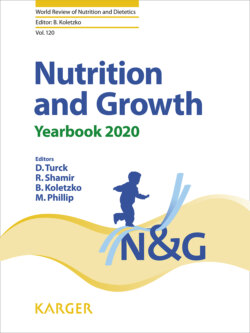Читать книгу Nutrition and Growth - Группа авторов - Страница 22
На сайте Литреса книга снята с продажи.
Growth pattern of infants with gastroschisis in the neonatal period
ОглавлениеHall NJ1,2, Drewett M2, Burge DM2, Eaton S3
1University Surgery Unit, Faculty of Medicine, University of Southampton, Southampton, UK; 2Department of Paediatric Surgery and Urology, Southampton Children’s Hospital, Southampton, UK; 3Developmental Biology and Cancer Programme, UCL Great Ormond Street Institute of Child Health, London, UK
Clin Nutr ESPEN 2019:32:82–87
Background: Gastroschisis is a congenital abdominal wall defect, with evidence of intestinal failure in the early neonatal period requiring supportive parenteral nutrition for weeks to months. There is however limited information on growth of infants with gastroschisis.
Methods: This study is a retrospective review of all infants with gastroschisis managed in a single neonatal surgical unit over a 4-year period. Weight at birth, 10 days post-natal (±1 day), last day of any amount of parenteral nutrition, at discharge and at outpatient follow-up were converted to Zscores. During the period of review, parenteral nutrition policy did not change. This consisted of starting parenteral nutrition at day 2–3 (providing 100–120 kcal/day in a volume of 150 mL/kg/ day). All infants were kept nil by mouth until clinical evidence of intestinal motility, whereby enteral feeds were introduced. Results were reported as mean (SD).
Results: A total of 64 infants with gastroschisis were managed in the centre during the study period, and 61 (30 males) were included in this present study (3 excluded as were initially managed in another neonatal surgical unit). Mean gestation at birth was 36.0 (2.3), mean birth weight was 2.36 kg (0.54) and mean birth weight Z-score of –0.87 (0.85). Five infants did not receive any parenteral nutrition but the rest received parenteral nutrition until a mean of 29.8 days (21.3). Mean weight Z-scores fell to –1.19 (0.92) at day 10 with a nadir of weight Z scores of –2.24 (1.13) at day 71. Discharge weight Z score was significantly lower than birth weight Z-scores (Mean difference 0.84, p < 0.0001) and at time of stopping parenteral nutrition (Mean difference 0.48, p < 0.0001). Weight pattern during parenteral nutrition showed that weight Z-score fell during the first 10 days of life, with progressive increase and stabilised after 25 days of age. Weight fell following discontinuation of parenteral nutrition but stabilised approximately 30 days after.
Conclusion: This study demonstrated that despite nutritional support with parenteral nutrition, infants with gastroschisis show poor weight gain. Factors associated with weight gain and the long-term consequences should be evaluated in future studies.
Reprinted with permission from Elsevier.
| Comments | This interesting report showed that current contemporary nutritional support maybe inadequate for weight gain in infants with gastroschisis. In particular, poor weight gain or weight loss appears to be common at the time of transition from parenteral nutrition to enteral feeds. Research into different nutritional support of these infants is now needed. Longer term follow-up including data on linear growth is also needed. |
______________________
